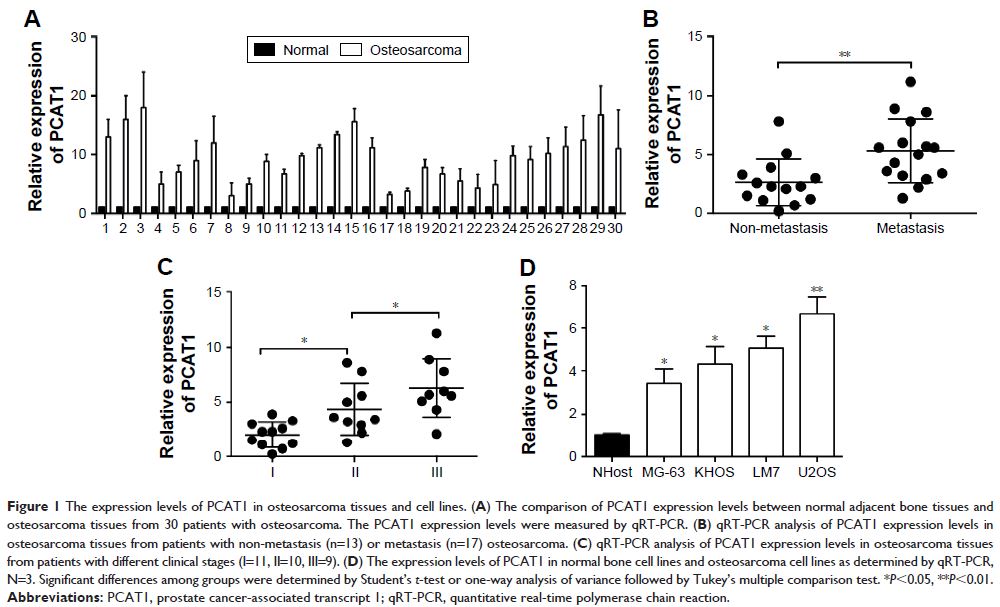108985
论文已发表
注册即可获取德孚的最新动态
IF 收录期刊
- 3.4 Breast Cancer (Dove Med Press)
- 3.2 Clin Epidemiol
- 2.6 Cancer Manag Res
- 2.9 Infect Drug Resist
- 3.7 Clin Interv Aging
- 5.1 Drug Des Dev Ther
- 3.1 Int J Chronic Obstr
- 6.6 Int J Nanomed
- 2.6 Int J Women's Health
- 2.9 Neuropsych Dis Treat
- 2.8 OncoTargets Ther
- 2.0 Patient Prefer Adher
- 2.2 Ther Clin Risk Manag
- 2.5 J Pain Res
- 3.0 Diabet Metab Synd Ob
- 3.2 Psychol Res Behav Ma
- 3.4 Nat Sci Sleep
- 1.8 Pharmgenomics Pers Med
- 2.0 Risk Manag Healthc Policy
- 4.1 J Inflamm Res
- 2.0 Int J Gen Med
- 3.4 J Hepatocell Carcinoma
- 3.0 J Asthma Allergy
- 2.2 Clin Cosmet Investig Dermatol
- 2.4 J Multidiscip Healthc

lncRNA PCAT1 与预后差相关,并促进骨肉瘤细胞增殖、侵袭、迁移和 EMT
Authors Zhang X, Zhang Y, Mao Y, Ma X
Received 19 September 2017
Accepted for publication 1 December 2017
Published 31 January 2018 Volume 2018:11 Pages 629—638
DOI https://doi.org/10.2147/OTT.S152063
Checked for plagiarism Yes
Review by Single-blind
Peer reviewers approved by Dr Akshita Wason
Peer reviewer comments 3
Editor who approved publication: Dr Jianmin Xu
Introduction: Osteosarcoma is a malignant primary bone cancer and is lethal to
children and adolescents. Recently, the dysregulation of long noncoding RNAs
(lncRNAs) has been shown in various types of cancers.
Aim: The present study aimed to examine the role of the lncRNA prostate
cancer-associated transcript 1 (PCAT1) in osteosarcoma progression.
Materials and
methods: The expression levels of relevant
genes in clinical samples and cell lines were determined by quantitative
real-time polymerase chain reaction. Cell proliferation, invasion and migration
were examined by CCK-8 assay, transwell invasion and migration assay, respectively.
Cell apoptosis and cell cycle were detected by flow cytometry. Protein levels
were detected by Western blot.
Results: Our results showed that PCAT1 was upregulated in osteosarcoma
tissues when compared to normal bone tissues. PCAT1 was also upregulated in
osteosarcoma cell lines when compared to normal bone cell line. The
upregulation of PCAT1 was significantly associated with advanced clinical
stage, tumor metastasis and shorter overall survival in patients with
osteosarcoma. In vitro studies showed that overexpression of PCAT1 in MG-63
cells enhanced cell proliferation, cell invasion and migration and
epithelial-to-mesenchymal transition (EMT); decreased cell apoptotic rate; and
also caused an increase in cell population at S phase with a decrease in cell
population at G0/G1 phase. Knockdown of PCAT1 in U2OS cells suppressed cell
proliferation, cell invasion and migration, and EMT; increased cell apoptotic
rate; and caused an increase in the cell population at G0/G1 phase with a
decrease in cell population at S phase.
Conclusion: Taken together, our results suggest the oncogenic role of PCAT1 in
osteosarcoma progression.
Keywords: osteosarcoma, PCAT1, metastasis, overall survival, cell proliferation,
EMT
